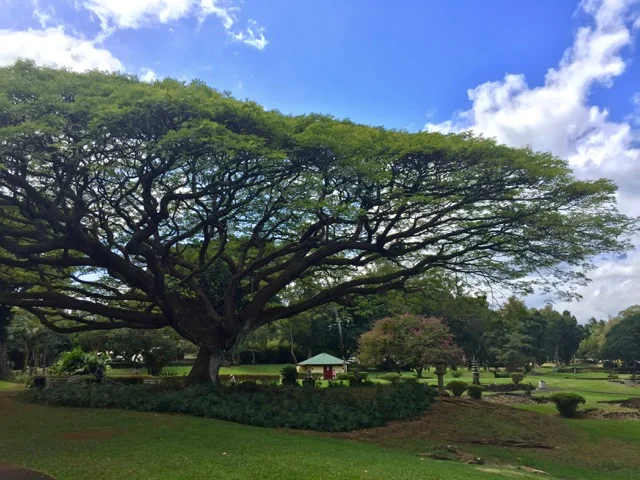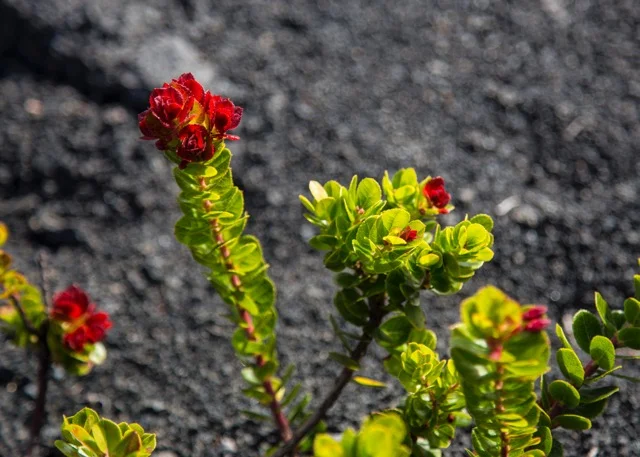Thursday morning we were up super early to head back over to the museum overlook to check out the crater at sunrise. The sunrise itself wasn’t overly spectacular, but it was really interesting to watch, as the glow of the crater got replaced by the glow of the sunrise. It was also much less windy, which made taking pictures easier.
Sunrise at the Kilauea crater
A close up of lava bursting out in the lava lake.
As the sun rose, we lost the view of the lava in the crater
As the light came up, you could really see the steam vents on the crater floor
If you watched long enough, lava flares appeared in different places along the lava lake
And it was less busy, which was nice. I took some photos and even shot a bit of video, which I’ll try and do something with. There was still lots of activity in the crater, which made us want to stick around until after the sun came up. But we also had a busy day ahead of us, so it was time to head off.
It was a very clear day, and we had a great view back to Mauna Kea, our destinattion later that day
So we headed to Volcano House for some breakfast. We had a big day ahead of us, as we had booked a tour to take us up to the top of Mauna Kea for the sunset, and to do some stargazing at the observatory visitor center. But that wasn't until the mid-afternoon, so we decided to do a hike in the park in the morning. As we got off to an early start, we were able to get out before the ark got too busy.
A view of the crater from Volcano House at breakfast
The hike we chose, Kilauea-iki, was a little more than 4 miles, and hikes you around the top of, and then through an extinct crater on the volcano. This one erupted last in 1959, and there was some unbelievable video footage of the eruption in Volcano House. It was pretty wild to think that less than 60 years ago, where we were walking was molten lava.
We were ready to hike, but decided to have a look at the lava tube before heading out on thenhike into the crater
We started the hike at one of the park's signature attractions, the Thurston Lava Tube. This huge cave lets you walk through an old lava tube from the eruption. We had been in some lava tubes in Oregon, and they are always impressive. Normally, this site is incredibly busy, but as we were starting early we pretty much had it to ourselves.
The entrance to the lava tube
The inside of the lava tube was a bit eerie
After exploring the lava tube, we started out on the hike. The first part of the hike took us along the top of the crater rim, though what is now a pretty mature tropical rainforest. There were a ton of birds, constantly teasing us with their songs and brief glimpses. They were almost impossible to get pictures of, but Justine managed a couple.
The hike started very high up - looking down into the crater
For a sense of perspective, the hiker on the trail across the crater floor
Eventually, the path started to descend into the crater, and we got to walk across the entire width of the crater floor, right on the old lava field. It is a surreal experience.
A view of the trail across the crater floor
It's a totally alien landscape
But even here, life eventually finds a way
There are so many different types of lava - in places it's really jagged and sharp, the way you picture lava in in your mind. In other places it's smooth and flows, and it seems like the lava just cooled in place. In many places it's collapsed in on itself, and in other places gases have burst up from below, creating these explosions of rock. And in a number of places there are still steam vents, where super hot gases are still escaping from the ground. If you put your hand in from of a stream vent, you can burn yourself the escaping gases are so hot.
Where the steam vents come out in volume, life starts growing on the rocks
Looking back across the crater, along the trail
You just have to take this type of warning seriously...
The crater is probably a couple of miles across, and we took our time exploring it as we hiked across. It's very hard to describe, so I'll let the pictures to the talking. Eventually we had to hike our way back up the crater rim and to the parking lot where the car was parked. It was only about 10:00 at that point, so we had lots of time before the start of our tour. So we headed back to the cabins and had a shower, before driving into town to check out Hilo.
The town of Hilo was not all that impressive - pretty run down actually - which was surprising. It is a port town, right on the ocean, and our first task was to find the hotel where we were meeting our tour guide. It was next to this beautiful little seaside park - Liliuokalani Gardens - and we spent a half hour or so exploring the park and the local area. After that, we headed into the downtown area to have some lunch. We found a good sushi place, and had some amazing sushi. The tuna was so fresh and tasty - best I've had since I was in Japan, and the sushi in Vancouver is pretty amazing.
A monkeypod tree in the gardens - such an amazing tree
The park was right on the edge of the ocean, with this beautiful little lagoon out front
The garden was Japanese and Chinese themed
A view up inot the canopy of the monkeypod tree
After lunch it was time to head over to the hotel to catch up with our tour group for our trip up the mountain! As it turned out, our group was quite small - just us and another couple, which was excellent. Our driver Daisy drove us back across the island towards Mauna Kea, chatting the whole way and giving us lots of information about the island and what we were about to see that night. We picked up the other two people at a parking lot at the base of the mountain, then started the drive up to the visitor center.
Mauna Kea is 14,000' tall, so altitude sickness is a real issue. The visitor center is at 9,000', and the plan was to stop there for an hour to acclimatize, and try and get used to the altitude. We had an hour to kill, so Justine and I did a short hike up to a look out point, to take in the view. The view was pretty amazing, and as we were quite high, the clouds kept blowing in and out, at times leaving us completely encased in clouds. Soon enough it was time to head up to the top!
A view down from our short hike on Mauna Kea, near the visitor center
The drive up from 9,000' to 14,000' feet was quite the experience. The road is well maintained - dirt in places, but mostly paved, and eventually you reach a level where there's snow on the roadside. Daisy mentioned that they had received something like 6 feet of snow earlier in the winter. So weird to see snow in Hawaii.
Not long after we climbed from the visitor center, we were above the clouds
There are so many cinder cones visible from the view points on the way up
Eventually the observatories started coming into view! There are 14 observatories on top of Mauna Kea, including one partially run by Canada. They are scattered across the summit, waiting for the night to fall so they can start their observations of the universe. Sadly, you cannot go into the observatories - that would have been amazing.
Above the clouds, looking back to Haleakala on Maui
One of the many observatories at the summit
It was seriously cold up at the top, and we needed all the layers of clothing. We tried to go for a short walk around the summit area, but even that small bit of exertion almost killed me. I was very light headed as we walked about. Before long, the sun began to set and we were blessed with an amazing sunset. It was really spectacular.
Sunset on Mauna Kea
The colour got amazing, right before the sun dissappeared
Once the sun set, we started back down the mountain. It was a very different experience descending in the dark. We stopped again at the Visitor Center, where we spent a bit of time watching a night sky show from one of the rangers. He had a very powerful green laser that he used to point out things like the Hubble Space Telescope passing overhead, Venus and Mars, Polaris and other constellations in the sky. He was very entertaining, and gave us lots of great info. Sadly, we had to depart before the show was over.
The drive back was pretty uneventful, and as we had a very early start the next morning we had to get to bed right away. It was another cold night in our cabin in the park.
















































